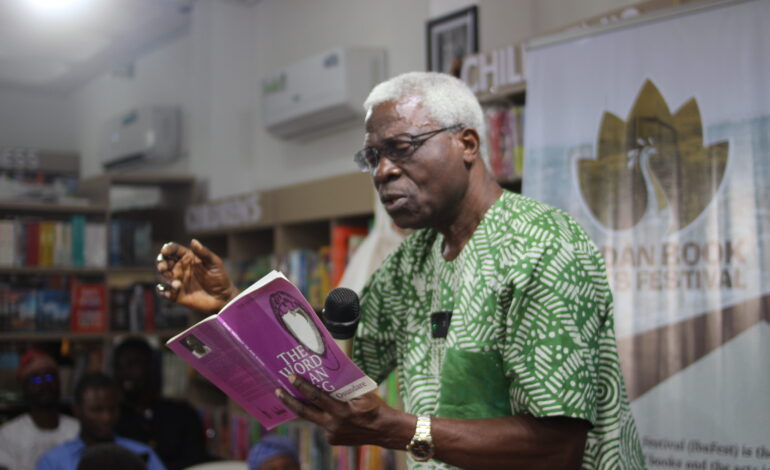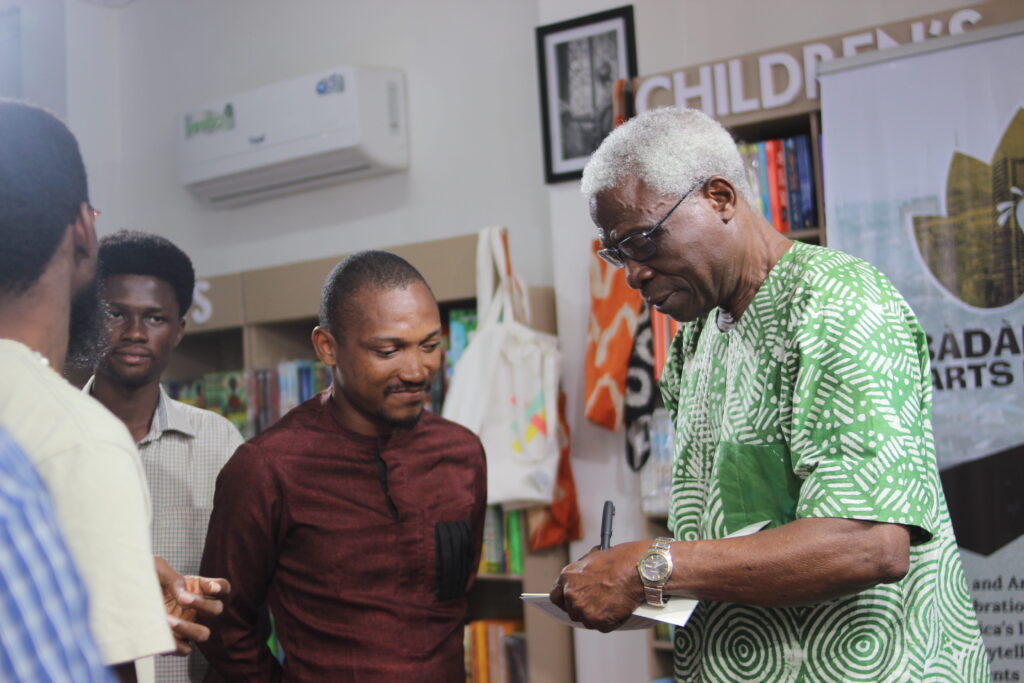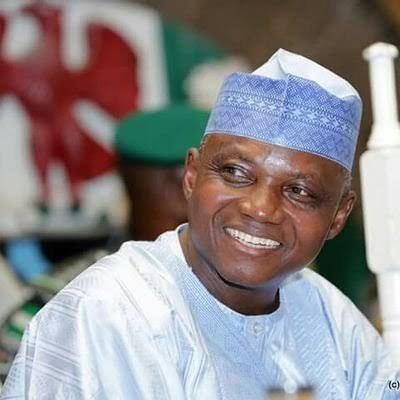We have no country yet, says Osundare at Ibadan Invocations of the Word reading event

By Godwin Okondo
IN a stirring prelude to the inaugural Ibadan Book and Arts Festival (IbaFest), the city of Ibadan played host to a remarkable literary gathering tagged ‘Invocations of the Word: A Day of Poetry and Conversations with Niyi Osundare.’ Held on Saturday, August 16, 2025, at RovingHeights Bookstore, Bodija, Ibadan, the event brought together book lovers, creatives, scholars, and cultural leaders across the Cultural and Creative Industries (CCI) to celebrate the power of storytelling and reflect on the state of the nation.
The 3-hour event, rich in poetic performances and intellectual exchange, honoured the legendary poet, essayist, and public intellectual, Professor Niyi Osundare. It featured live readings, spirited conversations, and audience engagement that left attendees both inspired and introspective. The event welcomed literary dignitaries including Prof. Femi Osofisan, Dr. Ayodeji Shittu, Prof. Mark Osama Ighile, Prof. Nelson Fashina, Prof. Adeshina Afolayan, Prof. Doyin Agoru, Dr. Folasade Anita Ajao, Mr. Steve Shaba of Kraft Books, and Comrade Adewumi Olowoniyi, Coordinator of the Centre for Change, Oyo State chapter. The gathering featured some of Nigeria’s fast rising poets, including Pamilerin Jacob, Obafemi Thanni, Sodiq Oyekanmi, Olajuwon Opeyemi Folashayo, Asan, Flourish Joshua, and Oluwatomisin Olorunfemi who read from a wide range of poems from Prof. Osundare’s oeuvre.
Festival Director, Servio Gbadamosi expressed heartfelt gratitude to attendees, noting that despite the by-elections in parts of the city, the turnout was a testament to the enduring power of literature.
“This has been a dream the team has nurtured for years,” Gbadamosi said. “It’s not just another book reading—it’s a return to where it all began: Ibadan.” Gbadamosi also announced the inaugural Ibadan Book and Arts Festival, with the theme “The Past as Prologue to the Future”, scheduled to hold on October 24–25, 2025, at the University of Ibadan’s International Conference Centre. He explained that IbaFest will convene writers, thinkers, and creatives from across Africa and beyond in a vibrant celebration of ideas, creativity, and cultural dialogue.
Prof. Osundare, in turn, praised Gbadamosi for his tireless efforts in preserving poetry and literature in Nigeria, saying: “I thank him for what he has been doing for poetry and publishing in Nigeria over these years.”

Prof. Niyi Osundare autographing copies of his book for his fans
Opening his reading, Prof. Osundare reminded the audience that poetry is not merely words on a page but a full-bodied experience: “Poetry takes control of the whole body. Your face is the dictionary, and the parts of your body are consonants and powers.”
His first reading, “Invocations of the Word”, from his collection The Word is an Egg, was a fiery testament to the power of language to stir, provoke, and heal. Flourish Joshua’s bilingual rendition of ‘In the Mood for Love’ added a vibrant call-and-response rhythm that drew laughter, applause, and audible delight from the audience. It was a moment that captured the communal spirit of poetry—its ability to connect, entertain, and provoke thought.
In a moment of solemn reflection, Osundare declared: “We have no country yet!”, and shared his recent experiences as a Nigerian citizen, lamenting the systemic failures that disable rather than empower: “Nigeria disables its citizens; it rarely does anything for them, and it also prevents them from doing anything for themselves.” He spoke candidly about the difficulty of advocacy in Nigeria, sayin, “It is difficult to stand on your own to speak the truth.”
The literary critic urged youths to study the sources of Nigeria’s problems and ensure that a repetition of past errors does not occur by choosing to be different: “They (youths) also must study the sources of the problems of Nigeria, and make sure that they themselves don’t repeat those problems, those dysfunctional propensities in their own lives,” Osundare said. “Because it is really no excuse to say, ‘yes, I became a thief because the governor stole money or the legislator stole money.’ No! You have to be different, and you have to be able to think critically. Our rulers don’t think as I’ve always said. The value of education is that it makes us critical and interrogative. And there is a lot to criticise and question in the way Nigeria is being run.”
Osundare also addressed the challenges of writing authentically from the diaspora: “What our diaspora is doing to our writers is killing them. You can’t write authentically and passionately about your country when all you have is garnered from the internet—you are too far from the bleeding wound.” This, he explained, is why he remains rooted in Nigeria, close to the pulse of its struggles and triumphs. He lamented the lack of technological innovation among Nigerian publishers and the difficulty of accessing his internationally published works, such as Green: Sighs of Our Ailing Planet, which was released in the United States. He also criticized the deteriorating state of Nigerian universities and the lack of sustainable practices, and invoked the old adage, “We did not inherit the earth from our ancestors, but we borrowed it from our children.”
Renowned journalists Michael Olatunbosun and Oluwaseun Akinola moderated a robust conversation with the poet. Olatunbosun described Osundare as both a ‘writer’ and a ‘righter,’ probing how he maintains his principles in a country that challenges sanity. Osundare responded: “One of the most difficult things to do in Nigeria is to keep your sanity and principles.” Akinola asked about Osundare’s satirical critique of the judiciary as captured in the poem, ‘My Lord, Tell Me Where to Keep Your Bribe,’ to which he responded that the institution remains aspirational, not yet fully just, and stressing the importance of selecting its stewards wisely, as they shape the future of justice.
Members of the audience posed questions on corruption, survival, Artificial Intelligence, and the future of creative writing. Osundare’s response was unwavering: “If there is life, there is hope,” and urged Nigerians to keep hope alive, emphasizing that change requires both leadership and citizens’ responsibility: “Bad leaders bring out the worst in their citizens.”
When asked to define his literary legacy in one line, Osundare demurred: “That is for the future and the people to decide—whether my pluses beat out my minuses.” Yet he made it clear that he does not wish to be remembered negatively.
The event was not just a celebration of poetry—it was a call to action, a reminder of literature’s power to illuminate, challenge, and inspire. It sets the stage for the upcoming conversation with polymath, Dr. Tunde Adegbola, scheduled for Saturday, August 23, 2025, at NuStreams Conference and Culture Centre, KM 110 Alalubosa GRA, Abeokuta Road, Ibadan. This landmark dialogue titled ‘The Polymath’s Journey: A Conversation on Humanity, Technology, and the Yoruba Worldview’ continues the runup to Ibadan Book and Arts Festival, with its avowed mission to explore the intersections of culture, intellect, and transformation.




